Unlocking High-Throughput Biology and Drug Discovery – View Speaker Presentations
Industry and academic scientists presented new paradigms in discovery, applications and workflows including HT-SPR. Topics included:
- New methods in antibody discovery and small molecules (such as DELs and PROTAC®s)
- Innovations using HT-SPR for drug discovery
- Challenging assay formats, such as membrane targets and rapid binders
- Strategies to streamline characterization workflows
- Best practices in experimental design and analysis
The speakers included scientists from …

You can view the slides from some of the presentations below.

Xiaomei Ge, PhD, Senior Scientist, Curia
Rapid discovery and characterization of monoclonal antibodies against the SARS-CoV-2 Delta spike protein
Abstract: The COVID-19 pandemic highlights the importance of fast therapeutic antibody discovery/development for emergency authorization use. Here we describe the rapid discovery and characterization of SARS-CoV-2 Delta spike-binding antibodies. High plasma titers were quickly achieved via PentaMice® immunizations, which was followed by single B cell optofluidics-based antibody recovery (Bruker® Beacon®). HTP recombinant production was performed using TunaCHO® cells. Subsequent binding kinetics and epitope binning was performed by the Carterra® LSA®. A diverse set of 19 distinct epitope-binding bins were identified for the 96 mAbs tested, with functional neutralizing mAbs largely clustered together within two bins of Delta spike S1 domain binders.
 Jiansheng Wu, PhD, VP, Head of Protein Sciences, WuXi Biologics
Jiansheng Wu, PhD, VP, Head of Protein Sciences, WuXi Biologics
Unlocking the Optimal Pairings of Bispecific Antibodies & Efficient Scale-Up Strategies
Abstract: With increasing interest in bispecific antibodies (bsAbs) for therapeutic development and AI integration in drug discovery, the demand for high throughput (HTP) bsAb production has soared. However, bsAb production faces challenges such as heterogeneity, production complexity, and stability issues, which impact the quality of the final product. This presentation will reveal innovative strategies to address these challenges, from small-scale HTP production of a vast number of bispecific antibody pairings to efficient scale-up after identifying optimal pairings. Real-world case studies will demonstrate the successful application of these strategies, achieving high yield and purity (>99% heterodimers) of bsAbs.

Ilse Roodink, PhD, Chief Scientific Officer, ImmunoPrecise Antibodies
Funneling while maintaining functional diversity: Strategies for amplified lead selection
Abstract: Therapeutic antibody campaigns heavily benefit from high diversity, not only at the sequence level, but also with respect to epitope coverage and functionality. Taking this aspect into account already during the early stages of drug discovery maximizes lead generation. The presented case study focuses on strategies combining in silico and in vitro technologies to accelerate lead selection from a diversified panel of antibodies directed against a potential target for different therapeutic indications. Guided by high throughput SPR-based characterizations, a diverse lead candidate panel, consisting of molecules with different mechanisms of action, was identified and further optimized to improve clinical suitability leveraging IPA’s in silico-driven, highly scalable humanization platform.

 David Eavarone, PhD, Associate Director, High-Throughput Screening, Absci
David Eavarone, PhD, Associate Director, High-Throughput Screening, Absci
Amir Shanehsazzadeh, Senior AI Scientist, Absci
Generative AI powered by high-throughput screening for antibody design
Abstract: Generative AI has the potential to improve the quality and speed of therapeutic antibody discovery. AI models require datasets of antibody-antigen interactions, consisting of paired complexes (sequence or structure) and labeled data. We demonstrate AI models succeeding on three antibody design tasks: structure design, structure-based sequence design, and sequence optimization. The first two tasks utilize generative models trained on antibody-antigen structures and are validated via HTS and SPR enabled by Carterra LSA®. The latter task uses predictive models, trained on high-throughput affinity datasets, for multiparametric affinity maturation. These efforts highlight the powerful synergy between AI and HTS for antibody design.
 Zimple Matharu, PhD, Principal Scientist, NGM Biopharmaceuticals
Zimple Matharu, PhD, Principal Scientist, NGM Biopharmaceuticals
High-throughput biophysical characterization of monoclonal antibodies for identifying epitope diversity
Abstract: Successful discovery of therapeutic antibodies with desired biological function centers around finding a suitable antibody candidate with epitope that influences the function of the target protein. By prioritizing affinity-based selections over epitope-based selections important functional epitopes could go unidentified. With the help of array-SPR Carterra platform high-throughput epitope binning analysis on a large mAb panel could be performed in the early drug discovery stage. The combination of epitope binning results with kinetics and sequence analysis can provide an efficient way of selecting high affinity antibodies representing a diverse set of sequence families and epitopes. These studies may further provide an effective way of identifying domain specific antibody binders. The detailed analysis would be discussed at the upcoming symposium.

Kirsty McHugh, PhD, Senior Postdoctoral Scientist, University of Oxford
High-throughput isolation and characterisation of monoclonal antibodies against PfRH5 – the leading blood-stage malaria vaccine candidate
Abstract: Plasmodium falciparum malaria is a major cause of morbidity and mortality, and new interventions are urgently needed. The P. falciparum reticulocyte-binding protein homolog 5 (PfRH5) antigen is a leading blood-stage vaccine candidate. Vaccines targeting PfRH5 have demonstrated antibody-mediated efficacy in clinical trials, but high, durable titers of inhibitory antibodies must be induced, a challenge which is difficult to meet with current generation vaccines. Our group have generated a broad panel of over 200 anti-PfRH5 monoclonal antibodies from PfRH5-vaccinated UK adult volunteers. By combining high throughput epitope binning using the Carterra LSA® platform with in vitro parasite growth inhibition assays we have revealed the diverse antigenic landscape of PfRH5 and identified inhibitory epitopes to a fine resolution. These results will help inform our next-generation vaccine design.
 Karanbir Pahil, PhD, Investigator, GSK
Karanbir Pahil, PhD, Investigator, GSK
High-throughput SPR in DNA-encoded library screening and hit validation
Abstract: DNA-encoded libraries (DELs) enable drug discovery chemists to identify thousands of hits from screening campaigns using billions of molecules, producing a vast array of small molecule structure-activity relationship data and potentially interesting chemical matter that needs to be triaged efficiently. DELs are made combinatorically, with every library member being assigned a unique DNA barcode, and every step of chemistry being compatible with the presence of DNA. Here, we show how we leverage the facility of resynthesizing DEL screening hits with DNA tags and the Carterra LSA® platform to enable high throughput binding assays.
 Mark Ibrahim, MS, Scientist, Merck
Mark Ibrahim, MS, Scientist, Merck
Leveraging computational design, miniaturization, and microfluidics to accelerate the discovery and engineering of therapeutic proteins
Abstract: Protein-protein interactions (PPI) are key regulators of physiology, and dysregulation of these interactions often cause disease states. Naturally, designing biotherapeutics to either disrupt or form PPIs is a common therapeutic strategy as demonstrated by many antibody-based therapies. To accelerate our discovery of biotherapeutic candidates, Discovery Biologics leverages novel computational design methods, miniaturized production platforms and microfluidic technologies with the capacity to measure thousands of PPIs in a single continuous experiment. Binding experiments at this scale combined with next-generation sequencing are being used with machine learning and statistical deconvolution to inform the design of new sequences with enhanced properties and specificity.
 Sharandip Nijjar, PhD, Senior Scientist, LifeArc
Sharandip Nijjar, PhD, Senior Scientist, LifeArc
High-throughput antibody discovery and screening at LifeArc
Abstract: At LifeArc we carry out high-throughput antibody screening to discover, characterise and deliver therapeutic monoclonal antibodies. We perform detailed kinetic profiling, epitope specificity, cross reactivity, functional binding and a suite of developability assessment assays to ensure successful downstream development of our lead molecule. We are always looking at ways to innovate our screening platform to ensure we remain at the cutting edge of technology, enabling us to characterise more molecules in a more efficient process. Recently we have purchased the Carterra LSA® and here we will share the evolution of our screening platform and how the LSA will enhance our discovery workflow.

Carterra Application Scientists
Driving discovery of novel medicines using Carterra’s HT-SPR technology
Abstract: Carterra’s LSA® and LSAXT platforms have changed the landscape of drug discovery. Across small and large molecule therapies as well as vaccines, the power of high throughput multiplexing and innovative assay configurations is enabling new strategies to tackle the undruggable space and discover novel medicines. This talk will emphasize areas where HT-SPR technology continues to push the boundaries of real-time, label-free binding. With HT-SPR, research workflows benefit from seamless data integrations and the necessary breadth and depth of data to deliver on the promises of AI/ML-based drug discovery.
“Loved the University of Oxford presentation. You can get a lot out of the data!”
“Nice mix of presentations and very open sharing environment.”
“Really interesting range of talks that complemented each other well.”
To learn more about Carterra and our offerings, contact us using the following link: Contact us
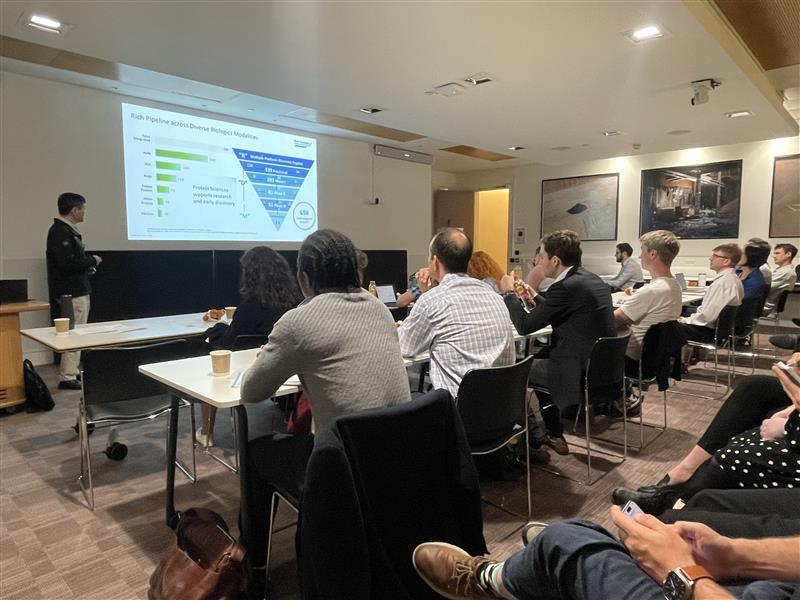
Jiansheng Wu, PhD, VP, Head of Protein Sciences, WuXi Biologics, shared his presentation on “Unlocking the Optimal Pairings of Bispecific Antibodies & Efficient Scale-Up Strategies” at the Oxford, UK Symposium.
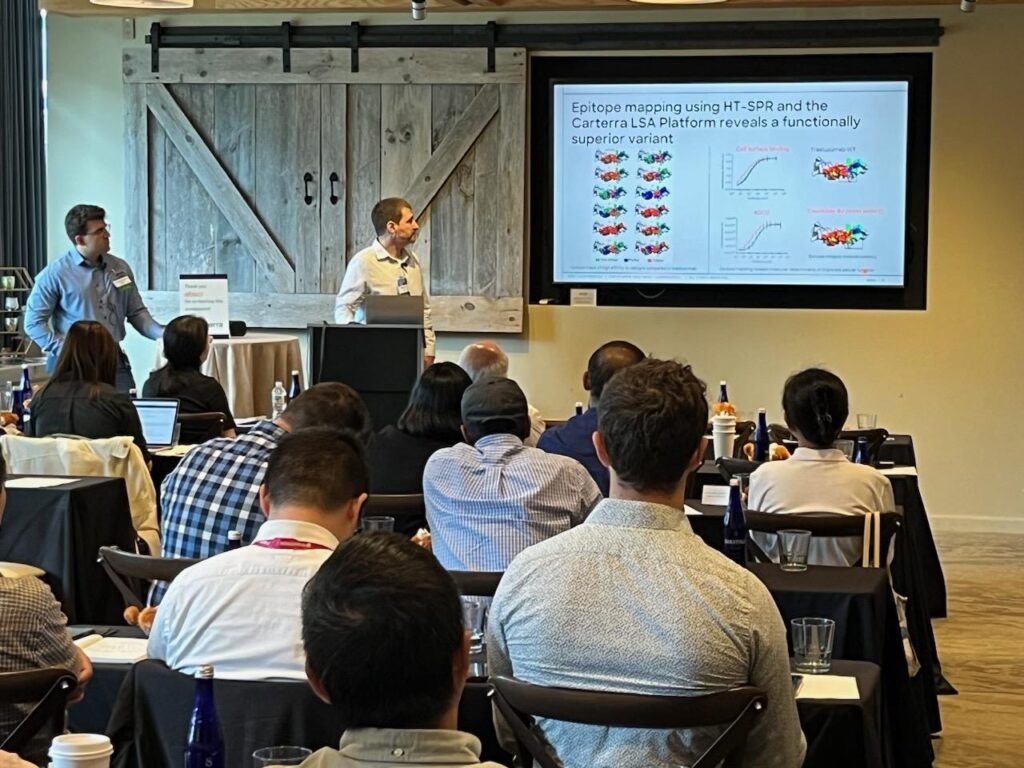
David Eavarone, PhD, Associate Director, High-Throughput Screening, Absci and Amir Shanehsazzadeh, Senior AI Scientist, Absci, shared their presentation on “Generative AI powered by high-throughput screening for antibody design” at the Boston, MA Symposium.
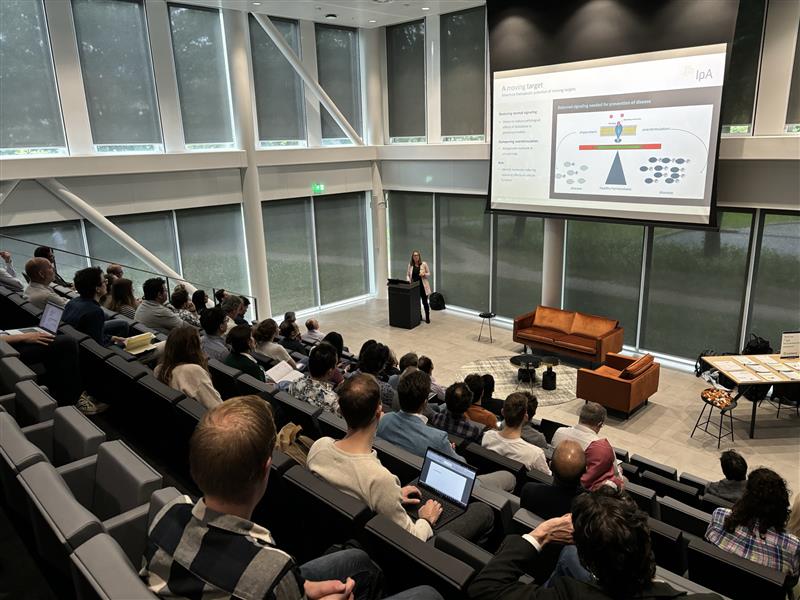
Presenters from various companies shared applications and workflows at the Utrecht, Netherlands Symposium.
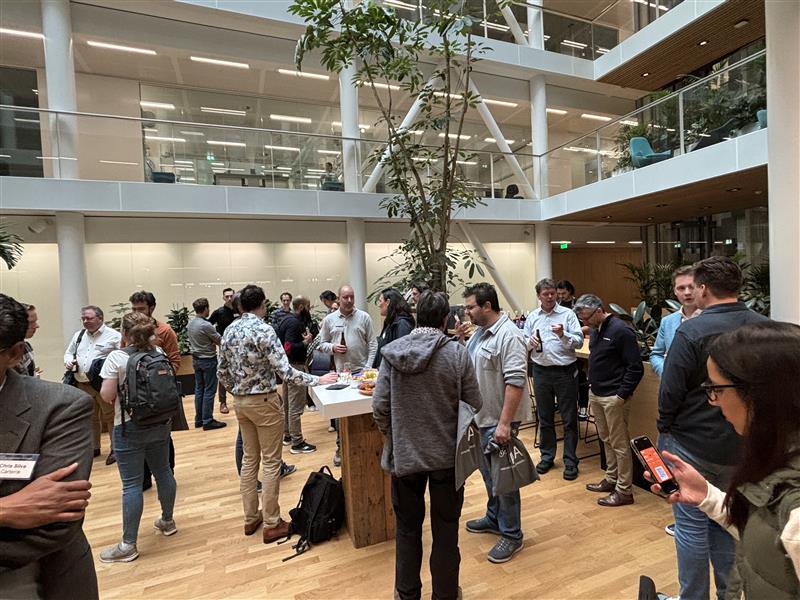
Attendees enjoyed networking with peers during the multiple breaks and lunch.
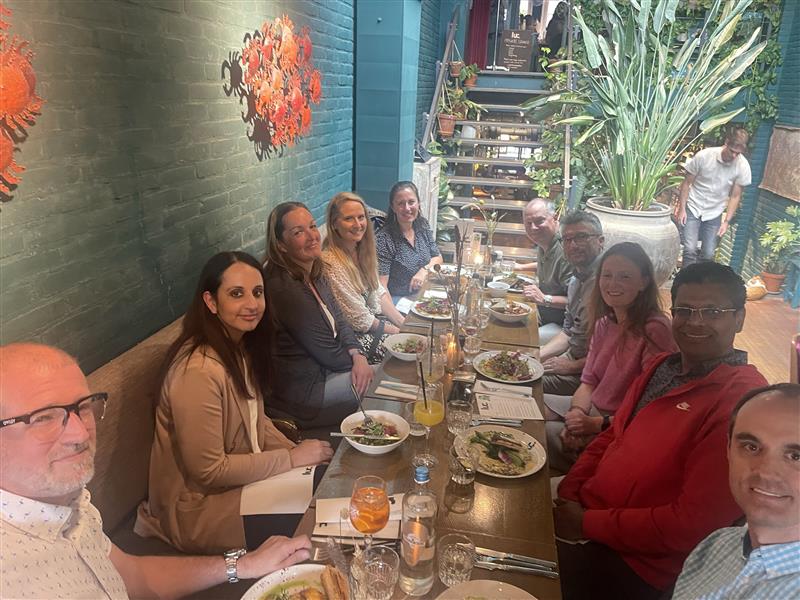
Symposia speakers and Carterra team members enjoyed dinner the night before the Utrecht Symposium.
